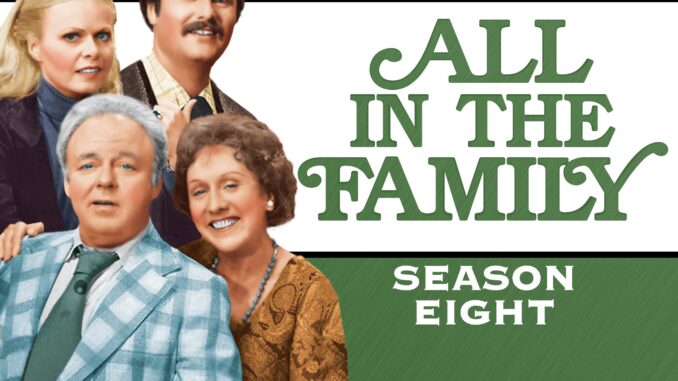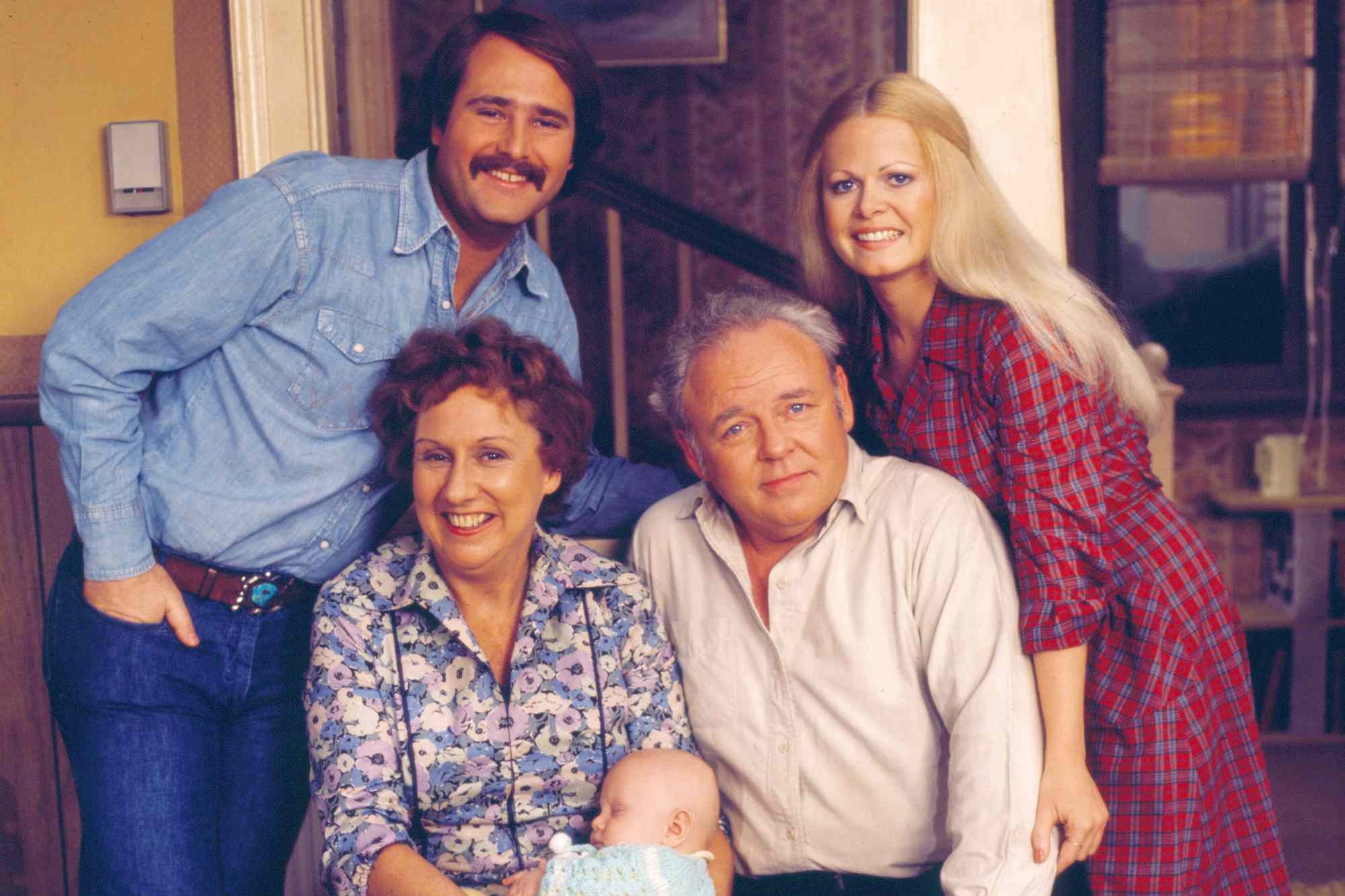
 Archie Bunker, as played by Carroll O’Connor, is a fascinating cultural pivot point for American television. He was a lout, a bigot, and perpetually angry, baffled by the social progress being made in the United States in the 1970s. He looked to the past frequently, and reminisced about how life used to be simpler; it’s no wonder that the theme song to his show, “All in the Family,” was called “Those Were the Days.” Bunker was not a good person … and yet continuously showed vulnerability and heart. Nostalgia is all well and good, but one might not want to vaunt the past; it wasn’t always better for everyone. It’s no wonder that “Family Guy” regularly lampoons “All in the Family” with such verve.
Archie Bunker, as played by Carroll O’Connor, is a fascinating cultural pivot point for American television. He was a lout, a bigot, and perpetually angry, baffled by the social progress being made in the United States in the 1970s. He looked to the past frequently, and reminisced about how life used to be simpler; it’s no wonder that the theme song to his show, “All in the Family,” was called “Those Were the Days.” Bunker was not a good person … and yet continuously showed vulnerability and heart. Nostalgia is all well and good, but one might not want to vaunt the past; it wasn’t always better for everyone. It’s no wonder that “Family Guy” regularly lampoons “All in the Family” with such verve.
As “All in the Family” progressed, Bunker proved again and again that he was capable of compassion, and could — if he was determined — rise above his prejudices. “All in the Family” is a tale of how a terrible man, long since calcified, develops a sense of principles. He was a bigot, but could occasionally learn not to be.
O’Connor, meanwhile, was quite the opposite. Indeed, O’Connor once appeared on “The Dick Cavett Show” to explain Archie Bunker in plain, unflattering terms. O’Connor saw Archie as an unhappy person. He’s not making it in the modern world, having been poisoned by hate and bigotry at an early age. O’Connor knew that Archie Bunker’s common descriptor of “the lovable bigot” was an oxymoron. Beyond his wise view of Archie Bunker, O’Connor was also deeply principled, and once refused to shoot scenes of “All in the Family” because of his integrity. According to an interview with The Plain Dealer (handily transcribed by MeTV), O’Connor stayed away from the set of “All in the Family” when the CBS workers went on strike. He refused to film with anyone who would cross the picket line.
Carroll O’Connor refused to cross the picket lines
For a little background, there was an eight-week CBS technicians strike back in 1972, when “All in the Family” was in its third season. The strike lasted from November 3 and wasn’t properly settled until December 29, as reported by the New York Times. The strike was about how CBS wanted to replace a lot of technicians with automated machines, and how the old technicians wouldn’t retain dominion over some of the new digital devices being folded into multiple productions. The settlement of the strike was hardly unanimous — the vote to settle was 364 to 206 — but it was enough to get the technicians back to work under slightly better conditions.
O’Connor, a lifelong union man, believed in the technicians. During the strike, he could have continued shooting “All in the Family,” but would have had to work with the higher-ups denying the technicians fairness, or with scabs who weren’t striking. O’Connor was plainspoken about the matter, saying:
“I’ve been a trade union man all my life. […] I cannot work with strikebreakers. If I worked with management personnel, I’d be helping to break a strike line. But the point is that I cannot work — by the top comic actor on the top comic show on TV — in an atmosphere of labor strife. […] As soon as the strike is over, I’ll report back to work. If they no longer need me, I’ll go home again.”
There was some speculation as to whether or not O’Connor’s relationship with “All in the Family” creator Norman Lear was strained by his comments. O’Connor commented that Lear often doubted the actor’s sincerity, and often implied that O’Connor was working against the better interests of the show; their relationship was classically strained. Of course, Lear is well known for bickering with his biggest stars, so O’Connor was likely following his heart … and getting in a little dig at Lear in the process.
The Untold Story Behind TV’s Most Controversial Sitcom Moment
When you think of groundbreaking television, All in the Family is one of those shows that changed everything. It wasn’t afraid to tackle taboo topics or show the ugly underbelly of American opinions through Archie Bunker, played masterfully by Carroll O’Connor. But what many fans don’t know is that O’Connor once took such a strong stance over a script dispute, he outright refused to shoot an episode. Why would the lead actor of one of TV’s most influential series take such a risk?
Let’s dig into the real story—one packed with artistic integrity, network tension, and a legendary actor who refused to compromise.
Who Was Carroll O’Connor, Really?
More Than Just Archie Bunker
To millions, Carroll O’Connor was Archie Bunker—blunt, bigoted, yet oddly lovable. But off-screen, O’Connor was nothing like the role he played. He was intelligent, thoughtful, and politically progressive. That contrast is exactly what made his portrayal so biting and believable.
A Passionate Artist with Principles
O’Connor was deeply invested in the quality and message of the show. He wasn’t just reciting lines; he cared about what was being said—and how. That passion would eventually put him on a collision course with the show’s creators and producers.
What Was All in the Family Really About?
A Cultural Earthquake on Prime-Time TV
Debuting in 1971, All in the Family broke every rule. It aired conversations that had never touched network television—racism, sexism, war, poverty, politics. Archie Bunker became the face of an old-school American mindset, while his son-in-law “Meathead” represented the progressive counterpoint.
Norman Lear’s Creative Vision
The show’s creator, Norman Lear, was a genius in his own right. He had a strong vision and often wrote or influenced scripts personally. Lear’s mission was to hold a mirror to American society. But what happens when two strong visions clash?
The Breaking Point — What Sparked the Refusal?
The Controversial Script That Crossed the Line
In one infamous moment, O’Connor flat-out refused to film an episode. The issue? A script he found deeply offensive and poorly written. He believed the character of Archie was being turned into a caricature, and the script lacked nuance. It wasn’t just about content—it was about quality.
O’Connor’s Bold Stand
Rather than play along, O’Connor walked off set. He knew it was risky—TV actors did not challenge producers like this back then. But he stood firm. To him, this wasn’t just a paycheck; it was art with a message.
The Fallout Between O’Connor and Producers
A Battle for Creative Control
O’Connor’s refusal sparked a media frenzy and behind-the-scenes showdown. Producers were shocked. CBS execs were livid. But O’Connor wouldn’t budge.
The Power Play That Changed TV Contracts
The standoff wasn’t just about one episode. It raised serious questions about actor input, creative freedom, and control in network television. It became a landmark moment in TV labor negotiations.
Norman Lear Responds
Public Tension, Private Respect
Lear later acknowledged the conflict but also expressed deep respect for O’Connor. He admitted the show may have gone too far at times, and O’Connor’s instincts were often right.
The Rewrite That Saved the Episode
Eventually, the script was rewritten—with O’Connor’s notes. That episode aired later, and fans never even knew how close it came to being scrapped entirely.
What This Moment Meant for TV History
A Fight for Integrity Over Popularity
Carroll O’Connor could’ve taken the easy road. He could’ve stayed quiet, done the job, and collected his check. But instead, he chose to protect the soul of the character—and the show.
Paving the Way for Future Creators
His stance helped set the stage for modern actors and writers to push back when their art is at stake. It showed that integrity can—and should—win over lazy storytelling.
The Legacy of All in the Family Post-Walkout
The Show Got Smarter
After the incident, the writing on All in the Family became sharper. The character of Archie Bunker remained flawed, but more nuanced. The humor grew richer, and the conversations more layered.
Fans Never Knew the Difference
Most viewers never realized anything had happened. That’s a testament to how smoothly the rewrite was done—and how O’Connor’s influence made the final product better.
What We Can Learn from Carroll O’Connor’s Stand
It’s Okay to Say No
Whether you’re on a sitcom or in a boardroom, saying “no” when something doesn’t feel right can be incredibly powerful. O’Connor showed that standing up for your values can change everything.
Quality Should Always Come First
In a world driven by ratings and revenue, O’Connor reminded everyone that quality—and message—matters more than anything.
Final Thoughts on the Power of Standing Your Ground
Carroll O’Connor’s refusal to shoot that infamous All in the Family episode wasn’t about ego or rebellion. It was about integrity, artistic vision, and refusing to compromise on values. He understood that television wasn’t just entertainment—it was influence. And he wasn’t about to misuse that platform.
His courageous stand left a legacy far beyond Archie Bunker’s living room. It became a moment of empowerment for all creators, proving that sometimes, saying no is the strongest story you can tell.
